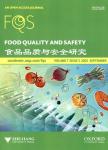Chemical characterization, release, and bioactivity of Eucalyptus camaldulensis polyphenols from freeze-dried sodium alginate and sodium carboxymethyl cellulose matrix
作者机构:Excellence Research Laboratory on Natural ProductsDepartment of MicrobiologyFaculty of Science and Natural Product Research Center of ExcellencePrince of Songkla UniversityHat YaiSongkhlaThailand
出 版 物:《Food Quality and Safety》 (食品品质与安全研究(英文版))
年 卷 期:2020年第4卷第4期
页 面:203-212页
核心收录:
学科分类:0832[工学-食品科学与工程(可授工学、农学学位)] 1004[医学-公共卫生与预防医学(可授医学、理学学位)] 08[工学] 083201[工学-食品科学]
基 金:This work was supported by Thailand’s Education Hub for ASEAN Countries(Grant No.TEH-AC 013/2017) the TRF Senior Research Scholar(Grant no.RTA 6180006) The Thailand Research Fund
主 题:microencapsulation freeze-drying antimicrobial antioxidant Eucalyptus camaldulensis regulated release
摘 要:Crude ethanolic extract of Eucalyptus camaldulensis was encapsulated with sodium alginate- sodium carboxymethyl cellulose (CMC) using freeze-drying techniques. The microcapsules were characterized for particle size, morphology, physicochemical parameters, and micromeritics properties. Antioxidant and antimicrobial activities of the microcapsules were also demonstrated. Results revealed an irregular-shaped microparticles with a mean diameter ranging from 6.7 to 26.6 μm. Zeta potential and polydispersity index ranged from −17.01 to 2.23 mV and 0.34 to 0.49, respectively. Percentage yield ranged between 70.4 and 81.5 per cent whereas encapsulation efficiency ranged between 74.2 ± 0.011 and 82.43 ± 0.77 per cent. Swelling index and solubility varied inversely with extract concentration, with a range of 54.4%-84.0% and 18.8%-22.2%, respectively. Antioxidant activities varied directly with the concentration of the extract. Minimum inhibitory and minimum bactericidal concentrations of the microcapsules against Gram-positive foodborne pathogens ranged from 0.19 to 3.12 and 0.19-12.25 mg/ml, respectively. The Higuchi model indicated a time-dependent, delayed, and regulated release of polyphenols at 37°C. The results suggested that alginate-CMC possessed good encapsulant properties that preserved the bioactive extract, thus might be employed for application of natural products in food systems.



